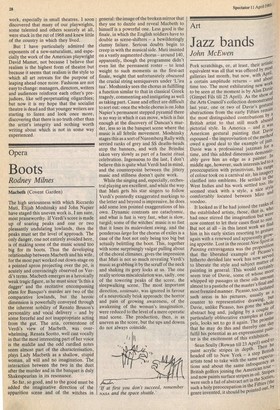Opera
Boots
Rodney Milnes
Macbeth (Covent Garden) The high seriousness with which Riccardo Muti, Elijah Moshinsky and John Napier have staged this uneven work is, I am sure, most praiseworthy. If Verdi's score is made up of soaring peaks and one or two pleasantly undulating lowlands, then the peaks must set the level of approach. The only danger, one not entirely avoided here, is of making some of the music sound too big for its boots. Thus the developing relationship between Macbeth and his wife, for the most part worked out down-stage on a pointed apron projecting over the pit, is acutely and convincingly observed on Verdi's terms. Macbeth emerges as a heroically weak tragic figure, as he must since 'Is this a dagger' and the recitative encompassing plans for Banquo's murder are two of the comparative lowlands, but the heroic dimension is powerfully conveyed through the inherent nobility of Renato Bruson's personality and vocal delivery — and by some forceful and not inappropriate acting from the gut. The aria, cornerstone of Verdi's view of Macbeth, was overwhelming. Renata Scotto, well cast vocally in that the most interesting part of her voice is the middle and the odd curdled notes seem almost part of the characterisation, plays Lady Macbeth as a shallow, stupid woman, all will and no imagination. The interaction between the two in the duet after the murder and in the banquet is duly Shakespearian in its resonance.
So far, so good, and to the good must be added the imaginative direction of the apparition scene and of the witches in general: the image of the broken mirror that they use to dazzle and reveal Macbeth to himself is a powerful one. Less good is the finale, in which the English soldiers have to double as scene-shifters — a bewilderingly clumsy failure. Serious doubts begin to creep in with the musical side. Muti insisted on a vastly augmented chorus — around 140, apparently, though the programme didn't even list the permanent roster — to lend weight to such moments as the first-act finale, weight that unfortunately obscured the crucial string semiquavers under 'L'ira tua'. Moshinsky sees the chorus as fulfilling a function similar to that in classical Greek tragedy, commenting and instigating as well as taking part. Cause and effect are difficult to sort out: once the whole chorus is on John Napier's permanent stepped pyramid there is no way in which it can move, which is fair enough at the discovery of Duncan's murder, less so in the banquet scene where the music is all febrile movement. Moshinsky stages this as a sort of Nuremberg Rally with serried ranks of grey and SS deaths-heads atop the banners, and with the Brindisi taken very slowly as part of a fascist ritual celebration. Ingenuous to the last, I don't believe this is quite what Verdi had in mind, and the counterpoint between the jittery music and stillness doesn't quite work.
While the singing and, especially, orchestral playing are excellent, and while the way that Muti gets his star singers to follow Verdi's pointedly exaggerated markings to the letter and beyond is impressive, he does add some less pointed exaggerations of his own. Dynamic contrasts are cataclysmic, and what is fast is very fast, what is slow, turgid; some of the witches' music is so fast that it loses its malevolent swing, and the ponderous largo for the chorus of exiles is a case of the foot not only being too big but actually belittling the boot, This, together with some surprisingly vulgar pulling about of the choral climaxes, gives the impression that Muti is not so much revealing Verdi's music as grabbing it by the scruff of the neck and shaking its gory locks at us. The one really serious miscalculation was, sadly, one of the towering peaks of the score, the sleepwalking scene. The most important direction, sostenuto, was ignored in favour of a neurotically brisk approach: the horror and pain of growing awareness, of the awakening of the woman's imagination, were reduced to the level of a mere operatic mad scene. The production, then, is as uneven as the score, but the ups and downs do not always coincide.










































 Previous page
Previous page